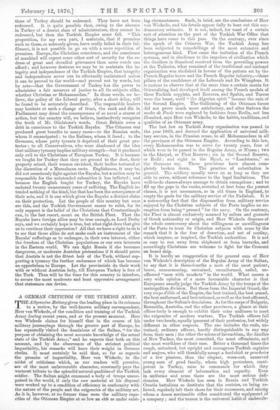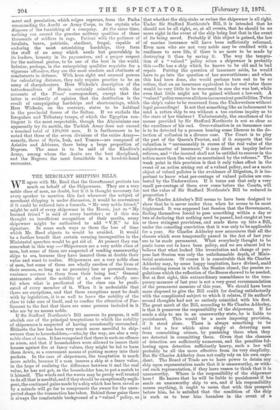A GERMAN CRITICISM OF THE TURKISH ARMY. T HE Allgerneine Zeitunggives
the leading place in its columns to a review, by the well-known military correspondent, Herr von Wickede, of the condition and training of the Turkish Army during recent years, and at the present moment. Herr on Wickede claims for himself that in the course of his military jonrneyings through the greater part of Europe, he has repeatedly visited the dominions of the Sultan, " for the purpose of obtaining the most accurate knowledge of the actual state of the Turkish Army," and he expects that both on this account, and by the observance of the strictest political impartiality, his remarks will have their weight in German circles. It must certainly be said that, so far as regards the promise •of impartiality, Herr von Wickede, in the midst of criticisms which, as our readers will perceive, are of the most unfavourable character, constantly pays the warmest tribute to the splendid natural qualities of the Turkish soldier. The Sultan might command a body of troops unsur- passed in the world, if only the raw material at his disposal were worked up to a condition of efficiency in conformity with the nature of the people and the exigencies of the military art. As it is, however, at no former time were the military capa- cities of the Ottoman Empire at so low an ebb as under exist- ing circumstances. Such, in brief, are the conclusions of Herr von Wickede, and his details appear fully to bear out this con- demnatory estimate. It is not, indeed, for want of a certain sort of attention on the part of the Turkish War Office that things have come to this pass. On the contrary, ever since the epoch of the Crimean War, the Turkish Army has been subjected to remodellings of the most extensive and heterogeneous kind. First came the imitation of the French systems, and in obedience to the impulses of civilisation which the dwellers in Stamboul received from the prevailing powers at the Tuileries, what remained of the traditional and national organisation was abolished in favour of the pattern set by the French Regular horse and the French Regular infantry,—those pillars of the confidence of the Leboeufs and De Wimpfens. It is curious to observe that at the same time a certain mania for Orientalising had developed itself among the French models of these Turkish copyists, and Zouaves, and Spahis, and Limos were the boast, until " the Algerian spirit" became the ruin of the Second Empire. The Gallicising of the Ottoman forces did not prove much more satisfactory, and after Sadowa the modes de Paris were replaced by fashions from Berlin, not less ill-suited, says Herr von Wickede, to the habits, traditions, and qualities of an Ottoman army.
The last law on Turkish Army organisation was passed in the year 1869, and decreed the application of universal mili- tary service, in the Prussian sense, to all Mohammedans in all the provinces of the Ottoman Empire. According to this law, every Mohammedan was to serve for twenty years, four of which were to be passed in the Regular Army, or Nizam ; two in the Idatyal, or First Reserve ; six in the Second Reserve, or Redif ; and eight in the Hyad, or " Landsturm,," as the Germans say. These provisions have almost com- pletely broken down. The practice of substitution is general. The soldiery usually serve on as long as they are able to serve, without reference to the legal limitations. The well-to-do classes.always manage to obtain exemptions ; and-to fill up the gaps in the ranks, recruited at best from the poorest classes, it is not uncommon, as in old times in England, to empty the gaols for the military service of the Padishah. It is a noteworthy fact that the dispensation from military service enjoyed by the Christian subjects of the Porte implies no ex- emption from being " pressed " for the navy. On the oontrary, the Fleet is almost exclusively manned by sailors and gunners of Greek nationality or origin, and Herr Wickede disposes of the whole controversy about the willingness or unwillingness of the Porte to trust its Christian subjects with arms by the remark that it is the fear of desertion, and not of mutiny, which inspires, or inspired, the Turkish authorities. It is not so easy to run away from shipboard as from barracks, and accordingly Christians are welcome to fight for the Crescent on board ship.
It is hardly an exaggeration of the general sum of Herr von Wickede's description of the Regular Army of the Sultan, to say that it is three-fourths a mob of the most patient, brave, unmurmuring, untrained, ununiformed, unfed, un- officered "men with muskets " in the world. What causes a very wide opinion of a more favourable character is that Europeans usually judge the Turkish Army by the troops of the metropolitan division. But these form the Imperial Guard, the very corps d'ilite of the Empire, the best trained, the best armed, the best uniformed, and best rationed, as well as the best officered, throughout the Sultan's dominions. As for the corps of Bulgaria, Roumelia, Anatolia, and the other provinces, a glance at their officer-body is enough to exhibit their utter unfitness to meet the exigencies of modern warfare. The Turkish officers fall under two heads, equally ignorant of their profession, but widely different in other respects. The one includes the rude, un- trained, ordinary officers, hardly distinguishable in any way from their men ; the other the scions of favouritism, the dandies of New Turkey, the most conceited, the most effeminate, and the most worthless of their race. Better a thousand times the rough, untrained, but upright and courageous Turkish captains and majors, who will thankfully accept a backshish or pourboire of a few piastres, than the elegant, worn-out, unnerved young men of good family, whom high protectors, omni- potent in Turkey, raise to commands for which they lack every element of information and capacity. Even in uniforms and arms there are the most serious defi- ciencies. Herr Wickede has seen in Bosnia and Turkish Croatia battalions so destitute that the sentries, on being re- lieved, regularly left their shoes for their successors, and among whom a dozen serviceable rifles constituted the equipment of a company ; and the reason is the universal habit of embezzle• ment and peculation, which reigns supreme, from the Pasha commanding the Aordu or Army Corps, to the captain who disposes of the furnishing of a company. At the same time, nothing can exceed the genuine military qualities of those thousands of soldiers in rags. Patient with the patience of fatalists, brave, patriotic, obedient, frugal, capable of enduring the most astonishing hardships, they form the stuff of an army which needs but generalship in its leaders, honesty in its paymasters, and a proper respect for the national genius, to be one of the best in the world. Inferior, perhaps, in the enterprising qualities requisite for a vigorous offensive, they are the most resolute and obstinate of combatants in defence. With keen sight and unusual powers for calculating distance, they only require practice to be an army of sharpshooters. Herr Wickede's description of the tatterdemalions of Bosnia certainly coincides with the accounts of the Times' correspondent, except that the latter is evidently of opinion that the destitution is the result of campaigning hardships and shortcomings, which Herr Wickede, on the contrary, states to be habitual in the provincial forces of the Sultan. If we exclude the Irregulars and Tributary troops, of which the Egyptian con- tingent is the most respectable, though the Abyssinians can apparently try its mettle, the Turkish Army does not exceed a nominal total of 120,000 men. It is furthermore to be noted that three of the seven divisions of the entire Army— namely, those of Syria, Irak, and Yemen—are composed of Asiatics and Africans, there being a large proportion of Negroes. The same is to be said of the Khedive's Army, among whom the Arabs are the best disciplined, and the Negroes the most formidable in a hand-to-hand encounter.



































 Previous page
Previous page